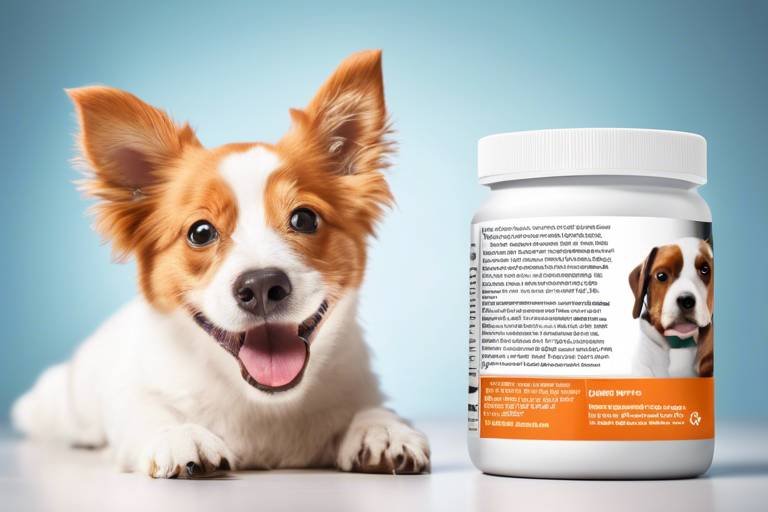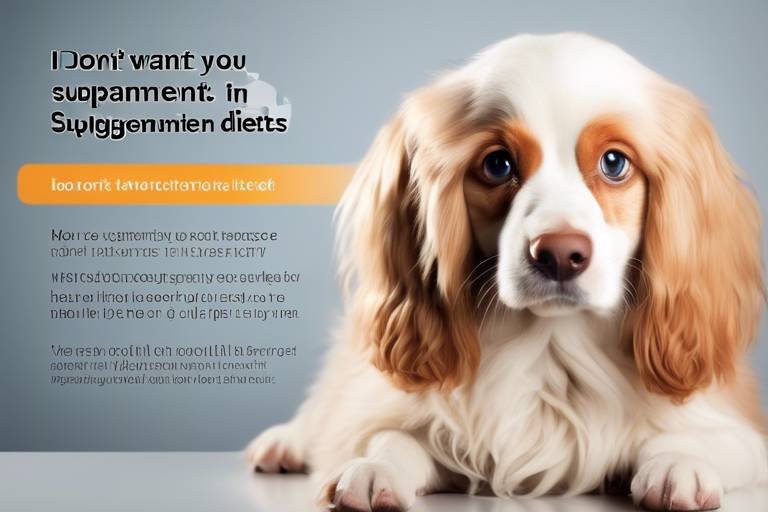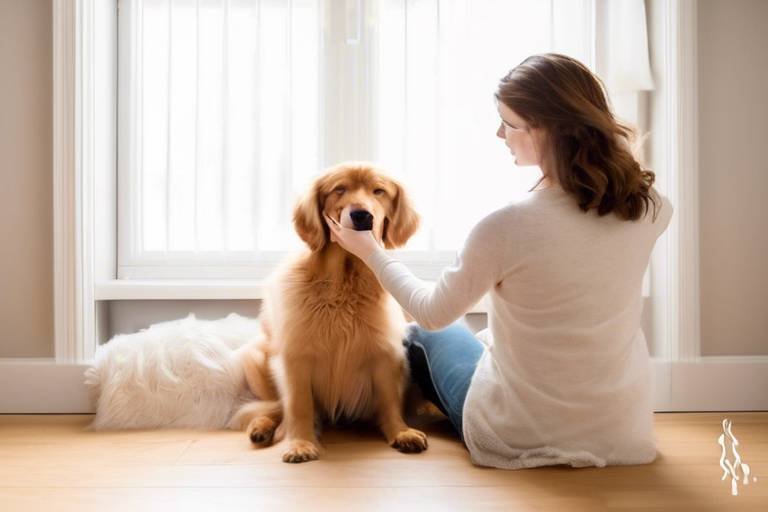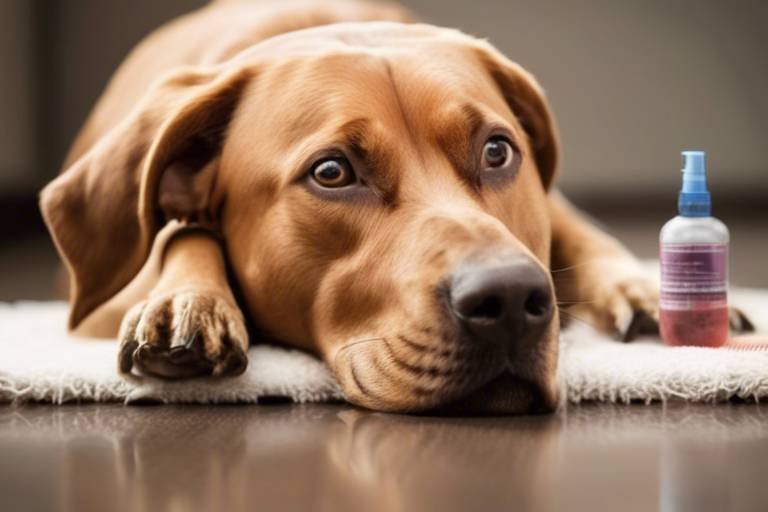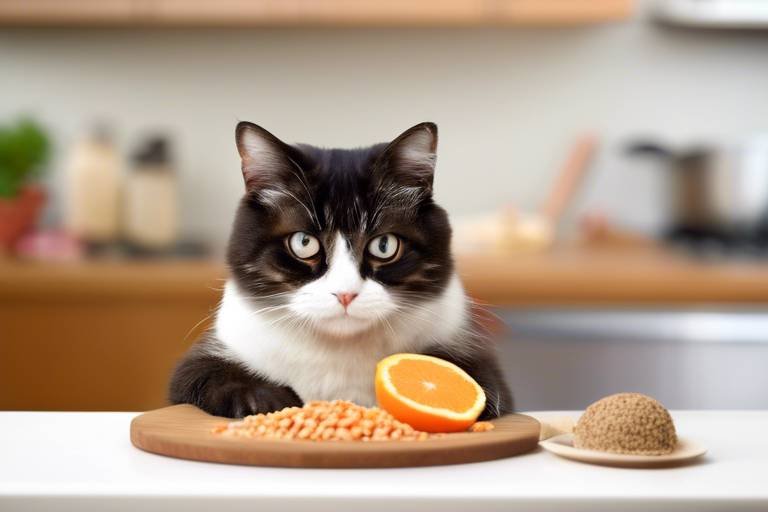The Role of Probiotics in Pet Health
In today's world, pet owners are becoming increasingly aware of the importance of maintaining their furry friends' health. One of the most exciting developments in pet care is the use of probiotics. These live microorganisms are not just a trend; they play a crucial role in enhancing the overall health and well-being of pets. Imagine your pet's gut as a bustling city, where good bacteria keep everything running smoothly while bad bacteria can cause chaos. Probiotics are like the friendly neighbors who help maintain order in this city, ensuring that your pet stays happy and healthy.
So, what exactly are probiotics? These tiny organisms are similar to the beneficial bacteria naturally found in your pet's digestive system. They can be found in various forms, including supplements and certain foods. The magic happens when these microorganisms are consumed; they travel to the gut and start working their wonders. They help maintain a balanced gut microbiome, which is essential for proper digestion, nutrient absorption, and a robust immune system. In essence, probiotics act as the unsung heroes of your pet's digestive health.
As we dive deeper into the significance of probiotics, we will explore their various benefits. From supporting digestive health to boosting the immune system, probiotics offer a multitude of advantages that can lead to a happier, healthier pet. With the right information, pet owners can make informed decisions about incorporating probiotics into their pets' diets. So, let’s embark on this journey to understand how these tiny warriors can make a big difference in your pet's life!
Probiotics are defined as live microorganisms that, when administered in adequate amounts, confer a health benefit on the host. In the context of pets, these microorganisms can significantly improve the quality of life for your furry companions. Probiotics have their origins in fermented foods and have been used for centuries in human diets, but their application in pet health is a more recent discovery. When introduced into your pet's diet, probiotics can help restore balance to the gut microbiome, which can be disrupted by factors such as poor diet, stress, or illness.
In the digestive system, probiotics work by competing with harmful bacteria for resources and space. They produce substances that inhibit the growth of pathogens, thus protecting your pet from gastrointestinal issues. Furthermore, probiotics can enhance the production of certain vitamins and short-chain fatty acids, which are vital for maintaining gut health. This intricate dance of microorganisms is what makes probiotics such a valuable addition to your pet's diet.
When it comes to the benefits of probiotics for pets, the list is extensive. Here are some of the key advantages:
- Improved Digestion: Probiotics help break down food more effectively, making it easier for your pet to absorb nutrients.
- Enhanced Immune Response: A healthy gut microbiome is closely linked to a strong immune system, helping your pet fend off illnesses.
- Better Nutrient Absorption: Probiotics assist in the absorption of essential vitamins and minerals, ensuring your pet gets the most out of their food.
One of the primary roles of probiotics is supporting digestive health. A balanced gut microbiome is essential for preventing gastrointestinal issues such as bloating, constipation, and diarrhea. Probiotics help create an environment where beneficial bacteria can thrive, while harmful bacteria are kept at bay. This balance is particularly crucial for pets who may be prone to digestive disturbances due to stress, dietary changes, or other factors.
Diarrhea can be a distressing condition for both pets and their owners. Probiotics can be effective in preventing and treating diarrhea by restoring gut balance. When a pet experiences diarrhea, the beneficial bacteria in their gut may be depleted. By introducing probiotics, you can help replenish these good bacteria, allowing your pet's digestive system to recover more quickly.
Food intolerances can lead to a host of digestive problems in pets, including gas, bloating, and diarrhea. Probiotics can assist in managing these intolerances by promoting a healthier digestive process. They help break down food components that may otherwise cause discomfort, making it easier for your pet to digest their meals.
Probiotics also play a crucial role in enhancing the immune system of pets. The gut is home to a significant portion of the immune system, and a healthy gut microbiome is vital for maintaining immune function. By promoting the growth of beneficial bacteria, probiotics can help strengthen your pet's defenses against infections and diseases.
Not all probiotics are created equal. When selecting a probiotic supplement for your pet, it's essential to consider factors such as species, strain, and formulation. Different strains of probiotics serve various functions, and some may be more effective for specific health issues than others. Always look for high-quality products that contain live and active cultures to ensure your pet receives the maximum benefit.
There are several common types of probiotics available for pets, each with its unique health benefits. Some of the most widely used strains include:
- Lactobacillus: Known for its ability to improve digestion and boost immunity.
- Bifidobacterium: Helps maintain gut health and can alleviate symptoms of irritable bowel syndrome.
- Enterococcus: Supports overall gut health and can be particularly beneficial for older pets.
Before introducing probiotics into your pet's diet, it's essential to consult a veterinarian. They can provide professional advice tailored to your pet's specific needs. A vet can help you determine the right probiotic strain and dosage, ensuring that you make the best choice for your furry friend.
Incorporating probiotics into your pet's daily routine can be a straightforward process. You can choose from various options, including probiotic supplements, specially formulated pet foods, and treats that contain live cultures. It's important to introduce probiotics gradually to your pet's diet to avoid any digestive upset. Start with small amounts and monitor your pet's response before increasing the dosage. By making probiotics a regular part of your pet's diet, you can help ensure they enjoy optimal health benefits.
1. Can all pets benefit from probiotics?
Yes, most pets can benefit from probiotics, especially those with digestive issues or weakened immune systems.
2. How do I know if my pet needs probiotics?
If your pet experiences digestive problems, has food intolerances, or frequently falls ill, probiotics may be beneficial.
3. Are there any side effects of probiotics for pets?
Generally, probiotics are safe for pets. However, introducing them too quickly may cause mild digestive upset. Always consult your veterinarian first.

Understanding Probiotics
Probiotics are often referred to as the good bacteria that work wonders in our pets' digestive systems. But what exactly are they? In simple terms, probiotics are live microorganisms, primarily bacteria and yeast, that provide health benefits when consumed in adequate amounts. They are naturally found in various foods and can also be added as dietary supplements. The origins of probiotics can be traced back to the early 20th century when scientists began to understand the importance of gut health. Since then, research has exploded, revealing how these tiny organisms can significantly impact the health of pets.
When we think about our pets' digestive systems, it's vital to understand that they are home to trillions of microorganisms, collectively known as the gut microbiome. This diverse community of bacteria plays a crucial role in breaking down food, absorbing nutrients, and even supporting the immune system. Probiotics help maintain a balanced gut microbiome by introducing beneficial bacteria that can outcompete harmful pathogens. Imagine your pet's gut as a bustling city; probiotics are the friendly neighbors that keep the peace and ensure everything runs smoothly!
So, how do these little heroes function? When probiotics enter your pet's digestive tract, they can help restore balance by:
- Competing with harmful bacteria for resources
- Producing substances that inhibit the growth of pathogens
- Enhancing the immune response by interacting with gut-associated lymphoid tissue
- Promoting the production of beneficial short-chain fatty acids that nourish gut cells
In essence, probiotics are like the unsung heroes of your pet's digestive health. They work tirelessly behind the scenes, ensuring that your furry friend can digest their food properly, absorb essential nutrients, and fend off illness. Understanding the role of probiotics is the first step in harnessing their power to enhance your pet's overall well-being.

Benefits of Probiotics for Pets
Probiotics are more than just a buzzword in the pet health community; they are a vital component of your furry friend's wellness regime. When you think about it, our pets' health mirrors our own in many ways. Just as we rely on a balanced diet and healthy gut flora to thrive, so do our beloved companions. The benefits of probiotics for pets are numerous and can significantly enhance their quality of life. Let's dive into some of the most compelling advantages that probiotics bring to the table.
One of the most prominent benefits of probiotics is their ability to improve digestion. Pets, much like humans, can experience digestive issues ranging from mild discomfort to severe gastrointestinal disorders. Probiotics work by introducing beneficial bacteria into the gut, which helps to maintain a balanced microbiome. This balance is crucial for breaking down food, absorbing nutrients, and keeping harmful bacteria at bay. When your pet's digestive system is functioning optimally, they are less likely to experience issues such as bloating, gas, or constipation.
Moreover, probiotics can play a significant role in enhancing the immune response. Did you know that a large portion of your pet's immune system is located in their gut? A healthy gut flora can help bolster their immune defenses, making them less susceptible to infections and diseases. By regularly incorporating probiotics into their diet, you can help your pet fend off illnesses and maintain a robust immune system.
Another key benefit is the improved nutrient absorption. Probiotics help break down food more efficiently, allowing pets to absorb essential vitamins and minerals better. This is especially important for growing puppies and kittens, who require optimal nutrition to develop strong bones, muscles, and overall health. A well-nourished pet is a happy pet, and probiotics can play a significant role in ensuring they get the most out of their meals.
Additionally, probiotics can assist in managing food intolerances. Many pets suffer from food sensitivities that can lead to digestive discomfort. By introducing the right strains of probiotics, you can help your pet's gut adapt to certain foods, reducing the likelihood of adverse reactions. This is particularly beneficial for pets with sensitive stomachs or those who have recently changed diets.
To summarize, the benefits of probiotics for pets can be categorized as follows:
- Improved Digestion: Helps maintain gut balance and alleviate digestive issues.
- Enhanced Immune Function: Strengthens the immune system by supporting gut health.
- Better Nutrient Absorption: Aids in breaking down food for optimal nutrient uptake.
- Management of Food Intolerances: Assists in adapting to certain foods, reducing discomfort.
Incorporating probiotics into your pet's diet can lead to a happier, healthier, and more vibrant life. As a pet owner, understanding these benefits not only helps you make informed choices but also empowers you to provide the best care possible for your furry friend. Remember, a healthy pet is a happy pet!
Digestive Health
When it comes to our beloved pets, is paramount. Just like us, pets can experience a range of gastrointestinal issues that can affect their overall well-being. This is where probiotics come into play, acting as tiny warriors in the battle for a balanced gut. Probiotics are live microorganisms that, when consumed in adequate amounts, can significantly enhance your pet's digestive system. Imagine these little guys as the good bacteria that help keep the gut in harmony, fighting off the bad bacteria that can cause chaos.
One of the primary roles of probiotics is to maintain a balanced gut microbiome. This balance is crucial because an imbalance can lead to a variety of digestive problems, including bloating, gas, and constipation. Probiotics work by populating the gut with beneficial bacteria, which can help alleviate these issues. When your pet's gut is healthy, they are more likely to absorb nutrients effectively, leading to better overall health. It's like having a well-organized pantry where everything is in its right place, making it easy to find what you need!
Moreover, probiotics can be particularly effective in preventing gastrointestinal disturbances. For instance, if your pet has ever experienced the dreaded diarrhea, you know how distressing it can be for both you and your furry friend. Probiotics can help restore gut balance, which is essential in reducing the frequency and severity of diarrhea. They achieve this by competing with harmful bacteria for resources and producing substances that inhibit the growth of these pathogens.
Another common issue many pets face is food intolerances. Just like humans, pets can have sensitivities to certain ingredients in their diet, leading to uncomfortable digestive symptoms. This is where probiotics shine again! They can assist in managing these intolerances by supporting the digestive process and helping to break down food more efficiently. When the gut is functioning optimally, your pet can enjoy their meals without the discomfort that often follows.
To illustrate the impact of probiotics on digestive health, consider the following table that summarizes the benefits:
| Probiotic Benefit | Description |
|---|---|
| Maintains Gut Balance | Helps keep the good bacteria thriving while combating harmful bacteria. |
| Reduces Diarrhea | Restores gut balance to prevent and treat diarrhea effectively. |
| Improves Nutrient Absorption | Enhances the ability to absorb essential nutrients from food. |
| Manages Food Intolerances | Aids in breaking down food and alleviating digestive discomfort. |
In conclusion, incorporating probiotics into your pet's diet can be a game-changer for their digestive health. By promoting a balanced gut microbiome, alleviating gastrointestinal issues, and improving nutrient absorption, probiotics can help your furry friends live happier, healthier lives. So, the next time you’re at the pet store, consider picking up a probiotic supplement. Your pet's gut will thank you!
Q: How do I know if my pet needs probiotics?
A: If your pet frequently experiences digestive issues such as diarrhea, bloating, or gas, they may benefit from probiotics. Additionally, if your pet has been on antibiotics or has a weakened immune system, probiotics can help restore gut health.
Q: Can I give my pet human probiotics?
A: It's best to use probiotics specifically formulated for pets. Human probiotics may not contain the right strains or dosages for your furry friend.
Q: How often should I give my pet probiotics?
A: The frequency of probiotic administration depends on the specific product and your pet's needs. Always follow the instructions on the label or consult your veterinarian for guidance.
Q: Are there any side effects of probiotics in pets?
A: Probiotics are generally safe for pets, but some may experience mild digestive upset initially. If you notice any severe reactions, consult your veterinarian.
Preventing Diarrhea
Diarrhea can be a distressing issue for both pets and their owners. It's not just an inconvenience; it can lead to dehydration and other health complications if not addressed promptly. This is where probiotics come into play, acting as a natural ally in the battle against diarrhea. But how exactly do they work? Probiotics help restore the balance of good bacteria in the gut, which can be disrupted by various factors including stress, dietary changes, or infections. When the gut microbiome is in harmony, it can effectively combat the pathogens that cause diarrhea.
One of the fascinating aspects of probiotics is their ability to produce substances that inhibit harmful bacteria. These live microorganisms can produce short-chain fatty acids, which not only nourish the cells of the intestinal lining but also create an environment that is less hospitable to harmful bacteria. For instance, the strain Lactobacillus rhamnosus has been shown to reduce the duration of diarrhea in pets, making it a popular choice among pet owners.
Moreover, probiotics can enhance the gut's immune response. When your pet's gut is healthy, it produces more antibodies and immune cells, which are crucial in fighting off infections. This is particularly important for young pets or those with compromised immune systems. By incorporating probiotics into your pet's diet, you're not just addressing diarrhea; you're promoting overall gut health and immunity.
It's also worth noting that the way probiotics are administered can influence their effectiveness. For example, probiotic supplements are available in various forms, including powders, capsules, and treats. Choosing the right form can make it easier for your pet to consume them regularly. Some pet owners even mix probiotics into their pets' food, which can be an effective way to ensure consistent intake. However, it's essential to consult with a veterinarian to determine the best approach for your specific pet's needs.
In summary, probiotics play a vital role in preventing diarrhea by restoring gut balance, enhancing immune function, and creating an unfavorable environment for harmful bacteria. By proactively incorporating probiotics into your pet's diet, you can significantly reduce the risk of diarrhea and promote a healthier, happier life for your furry friend.
- What are the signs of diarrhea in pets? Look for loose stools, increased frequency of bowel movements, and signs of discomfort.
- Can I give my pet human probiotics? It's best to use probiotics specifically formulated for pets, as human strains may not be effective or safe for them.
- How long does it take for probiotics to work? While some pets may show improvement within a few days, it can take a week or more for the full benefits to be realized.
- Are there any side effects of probiotics? Generally, probiotics are safe, but some pets may experience mild gastrointestinal upset when first introduced.
Managing Food Intolerances
Food intolerances can be a real puzzle for pet owners. Imagine your furry friend feeling uncomfortable after meals, experiencing bloating, gas, or even more severe digestive issues. This is where probiotics step in as a potential game-changer! Probiotics can help manage food intolerances by enhancing the digestive process and promoting a healthier gut environment.
When pets consume certain foods that don't sit well with them, their digestive systems can become imbalanced. This imbalance often leads to a decrease in beneficial gut bacteria, which are essential for breaking down food properly. Probiotics, which are live microorganisms, work to restore this balance. They help to break down complex carbohydrates and proteins that may trigger intolerances, making it easier for your pet to digest their food.
One of the fascinating aspects of probiotics is their ability to modulate the gut microbiome. By introducing beneficial bacteria into your pet's system, probiotics can help reduce inflammation and improve gut health. This is particularly important for pets with food intolerances, as their digestive systems may be more sensitive to certain ingredients. Probiotics can also enhance the production of digestive enzymes, further aiding in the breakdown of problematic foods.
Incorporating probiotics into your pet's diet can be as simple as choosing the right supplement or food that contains these beneficial microorganisms. For example, many pet foods now come enriched with probiotics, making it easier than ever to support your pet's digestive health. However, it's essential to choose a product that is specifically formulated for your pet's species and needs.
To give you a clearer picture, here's a quick overview of how probiotics can help manage food intolerances:
| Benefit | How Probiotics Help |
|---|---|
| Improved Digestion | Enhance the breakdown of food, reducing discomfort. |
| Gut Balance | Restore beneficial bacteria to counteract harmful ones. |
| Reduced Inflammation | Help decrease gut inflammation associated with intolerances. |
| Enhanced Nutrient Absorption | Improve the absorption of essential nutrients, aiding overall health. |
While probiotics can significantly help manage food intolerances, it's crucial to approach this strategy with care. Always monitor your pet's reactions when introducing new supplements or foods. If you notice any adverse effects, it’s best to consult with your veterinarian. They can help tailor a plan that addresses your pet's specific needs, ensuring that you find the right balance for their diet.
In conclusion, managing food intolerances in pets can be a challenging journey, but probiotics offer a promising solution. By restoring gut health and enhancing digestion, these tiny warriors can make a big difference in your pet's quality of life. So, if your pet struggles with food intolerances, consider incorporating probiotics into their diet and see the positive changes unfold!
- What are food intolerances in pets? Food intolerances occur when a pet's digestive system has difficulty processing certain ingredients, leading to discomfort and digestive issues.
- How do probiotics help with food intolerances? Probiotics restore gut balance, enhance digestion, and reduce inflammation, making it easier for pets to handle problematic foods.
- Can I give my pet any probiotic? No, it's essential to choose a probiotic specifically formulated for your pet's species and needs. Always consult your veterinarian before introducing new supplements.
- How long does it take for probiotics to work? While some pets may see improvements within a few days, it can take several weeks for probiotics to fully restore gut health and balance.
Boosting Immune Function
When it comes to our pets, their health and happiness are paramount. One of the most intriguing aspects of probiotics is their ability to boost immune function. You might be wondering, how can tiny microorganisms have such a significant impact on the immune system? Well, let’s dive into the fascinating world of gut health and immunity.
Probiotics are not just beneficial for digestion; they also play a critical role in enhancing the immune response of pets. The gut is home to a vast network of microorganisms, collectively known as the gut microbiome. This microbiome is essential for maintaining a healthy immune system. In fact, studies have shown that a large portion of the immune system is housed in the gut, making it a vital player in overall health.
When probiotics are introduced into a pet's diet, they help to maintain a balanced gut microbiome. This balance is crucial because an imbalance can lead to inflammation and a weakened immune response. By promoting the growth of beneficial bacteria, probiotics can help to outcompete harmful pathogens, effectively keeping them at bay. Think of it like a security team in a building—the more good guys you have inside, the less room there is for intruders!
Moreover, probiotics can enhance the production of specific antibodies and immune cells. For example, they can stimulate the production of IgA (Immunoglobulin A), an antibody that plays a crucial role in mucosal immunity. This is particularly important because it helps protect your pet against infections that enter through the digestive tract. Additionally, probiotics can also help modulate the immune response, ensuring that it is neither overactive nor underactive, which is essential for preventing autoimmune diseases.
To illustrate the connection between gut health and immunity, consider the following table:
| Probiotic Benefits | How They Help |
|---|---|
| Enhances Immune Response | Increases production of antibodies and immune cells |
| Reduces Inflammation | Balances gut microbiome, preventing overactive immune responses |
| Prevents Infections | Outcompetes harmful bacteria and pathogens |
Incorporating probiotics into your pet's diet can be a game-changer for their immune health. However, it’s essential to remember that not all probiotics are created equal. Different strains of probiotics offer different benefits, so it’s crucial to choose the right one for your pet's specific needs. Consulting with a veterinarian can provide you with tailored advice, ensuring that your furry friend gets the most out of their probiotic supplements.
In summary, probiotics are a powerful ally in boosting your pet's immune function. By supporting gut health, they enhance the immune response, reduce inflammation, and help prevent infections. So, whether you're looking to improve your pet's overall health or simply want to give their immune system a little extra support, consider adding probiotics to their daily routine. It’s a small step that can lead to big benefits!
- What are probiotics? Probiotics are live microorganisms that provide health benefits when consumed, particularly for gut and immune health.
- How do probiotics boost my pet's immune system? They help maintain a balanced gut microbiome, stimulate antibody production, and prevent harmful bacteria from taking over.
- Can all pets benefit from probiotics? Yes, most pets can benefit, but it's essential to consult with a veterinarian to choose the right strain and formulation.
- How can I incorporate probiotics into my pet's diet? Probiotics can be added through supplements, specially formulated pet foods, or treats containing probiotic strains.

Choosing the Right Probiotics
When it comes to for your furry friends, the process can feel a bit overwhelming. With so many options available on the market, how do you know which one is the best fit for your pet? It’s like shopping for a new toy; you want to ensure it’s safe, durable, and enjoyable! The same goes for probiotics. The first step is to understand that not all probiotics are created equal. Each type serves a different purpose and can be beneficial for various health issues. So, let’s break it down and make it easier for you!
One of the most important factors to consider is the species of your pet. Dogs and cats have different digestive systems and may require different strains of probiotics. For instance, a probiotic that works wonders for a dog might not have the same effect on a cat. Therefore, it's crucial to look for probiotics specifically formulated for your pet's species. Additionally, pay attention to the strain of probiotics. Different strains serve different functions; some may help with digestion, while others might boost the immune system. Here’s a quick overview:
| Probiotic Strain | Benefits |
|---|---|
| Lactobacillus acidophilus | Supports digestion and reduces diarrhea |
| Bifidobacterium animalis | Enhances immune function and gut health |
| Enterococcus faecium | Improves nutrient absorption and gut balance |
Another key aspect to consider is the formulation of the probiotic. Some probiotics come in powder form, while others are available as capsules or treats. Think about what your pet would prefer. If your dog is a picky eater, a tasty probiotic treat might be more effective than a capsule they refuse to swallow. On the flip side, if your cat is more open to powders, you can sprinkle it on their food for an easy incorporation into their diet.
Lastly, it’s essential to consider the quality of the product. Look for probiotics that are tested for efficacy and safety. Check for certifications or endorsements from veterinary professionals. A reputable brand will often provide clear information about their strains, dosages, and any clinical studies backing their product. Remember, you want the best for your pet, just like you would for yourself!
In conclusion, choosing the right probiotics for your pet involves understanding their specific needs, considering the species and strain, and ensuring the quality of the product. By taking the time to research and consult with your veterinarian, you can find a probiotic that will truly enhance your pet's health and happiness.
- How do I know if my pet needs probiotics? If your pet is experiencing digestive issues, has been on antibiotics, or shows signs of a weakened immune system, probiotics may be beneficial.
- Can I give my pet human probiotics? It's not recommended, as human probiotics may not be suitable for pets. Always opt for pet-specific formulations.
- How long does it take to see results? Results can vary, but many pet owners notice improvements within a few days to a couple of weeks.
Types of Probiotics
When it comes to probiotics for pets, it's essential to understand that not all strains are created equal. Each type of probiotic has its unique benefits and functions, tailored to meet the specific health needs of your furry companions. Some of the most common types of probiotics used for pets include:
- Lactobacillus: This is one of the most well-known probiotic strains, often found in yogurt and fermented foods. It aids in digestion and helps to maintain a healthy gut flora.
- Bifidobacterium: Another popular strain, Bifidobacterium is excellent for enhancing immune function and improving gut health. It can be particularly beneficial for older pets.
- Enterococcus: This strain helps in balancing the gut microbiome and can be effective in preventing diarrhea, making it a great choice for pets with sensitive stomachs.
- Saccharomyces boulardii: A beneficial yeast, this probiotic is known for its ability to combat gastrointestinal issues and restore gut health after antibiotic treatments.
Each of these strains plays a vital role in supporting your pet's health. For instance, while Lactobacillus focuses on digestion, Bifidobacterium is more about boosting immunity. This diversity in probiotic strains is similar to how different vitamins and minerals serve various functions in our bodies. Just like you wouldn't take a vitamin C supplement for everything, choosing the right probiotic for your pet is crucial.
Moreover, the effectiveness of these probiotics can vary based on the species of your pet. Dogs and cats have different digestive systems, and what works wonders for one may not be as effective for the other. Therefore, understanding the specific needs of your pet is paramount.
As you explore the world of probiotics, you might come across various formulations, including powders, capsules, and even treats. Each format has its advantages, but it's essential to choose one that your pet will readily accept. For example, a highly palatable treat might be the best option for a picky eater, while a powder mixed into food could work well for a pet that enjoys their meals.
In summary, knowing the types of probiotics available for your pets and their unique benefits is the first step toward enhancing their health. Just like a well-balanced diet is crucial for overall well-being, incorporating the right probiotics can help ensure your furry friends lead happy and healthy lives.
Q: Can I give my pet human probiotics?
A: While some human probiotics are safe for pets, it's always best to consult with your veterinarian before introducing any new supplements to ensure they are appropriate for your pet's specific needs.
Q: How do I know if my pet needs probiotics?
A: Signs that your pet may benefit from probiotics include digestive issues, such as diarrhea or constipation, a weakened immune system, or after a course of antibiotics. If you notice any of these symptoms, it's a good idea to discuss probiotics with your vet.
Q: How long does it take to see the effects of probiotics?
A: The time frame can vary, but many pet owners report improvements in their pet's digestive health within a few days to a week of starting probiotics. However, for more significant changes, it may take a few weeks of consistent use.
Consulting with a Veterinarian
When it comes to your pet's health, is not just a good idea—it’s essential. Just like we wouldn’t self-diagnose a health issue, our furry friends deserve the same level of care and expertise. Veterinarians are trained professionals who can provide invaluable insights into your pet's specific needs, especially when it comes to incorporating probiotics into their diet.
Before diving into the world of probiotics, it’s crucial to have a conversation with your vet. They can assess your pet’s individual health status, dietary habits, and any underlying conditions that may affect how probiotics work for them. For instance, some pets might have allergies or sensitivities that require special attention. Your vet can recommend the most suitable strains and formulations tailored to your pet’s unique situation.
Additionally, not all probiotics are created equal. There are various strains, each with distinct benefits. Your veterinarian can help you navigate this maze of options by suggesting products that have been clinically tested and proven effective. This is particularly important because some over-the-counter probiotics might not contain the right strains or adequate amounts to make a difference in your pet's health.
Moreover, it’s wise to discuss the dosage and administration of probiotics with your vet. Just like with any supplement, too much of a good thing can lead to unwanted side effects. Your veterinarian can guide you on how to introduce probiotics gradually, monitor your pet’s response, and make adjustments as needed. This tailored approach ensures that your pet receives the maximum benefit without risking their health.
In summary, while probiotics can be a fantastic addition to your pet's health regimen, they are not a one-size-fits-all solution. Consulting with a veterinarian not only helps you choose the right product but also ensures that you are making informed decisions that contribute positively to your pet’s well-being. So, before you rush out to buy that trendy probiotic supplement, take a moment to reach out to your vet. Your pet will thank you for it!
- What are probiotics? Probiotics are live microorganisms that provide health benefits when consumed, particularly for digestive health.
- How do I know if my pet needs probiotics? Consulting with your veterinarian is the best way to determine if probiotics would benefit your pet, especially if they have digestive issues or a compromised immune system.
- Can I give my pet human probiotics? It’s not recommended to give your pet human probiotics without veterinary guidance, as they may not be suitable for animal consumption.
- How long does it take for probiotics to work? The effects of probiotics can vary. Some pets may show improvements in a few days, while others might take longer to see noticeable changes.

Incorporating Probiotics into Your Pet's Diet
When it comes to enhancing your pet's health, incorporating probiotics into their diet can be a game changer. But how exactly do you go about doing this? It's simpler than you might think! First, you need to consider the various forms of probiotics available. You can find them in supplements, specialty pet foods, or even treats designed specifically to support gut health. Each option has its own merits, so it's important to choose what best fits your pet's lifestyle and preferences.
For many pet owners, adding a probiotic supplement to their furry friend's daily routine is the most straightforward approach. These supplements come in various forms, such as powders, capsules, or chews, making it easy to find one that suits your pet's needs. If you're opting for a powder, you can simply sprinkle it over their food. For those who have pets that are picky eaters, flavored chewable tablets can be a great alternative, ensuring that your pet enjoys their daily dose of gut-friendly bacteria.
If you prefer to go the natural route, consider incorporating probiotic-rich foods into your pet's diet. Some pet foods are specifically formulated with probiotics, which can help maintain a healthy gut microbiome. Additionally, certain human foods are safe for pets and packed with probiotics. For example, plain, unsweetened yogurt can be a delightful treat for dogs and cats alike, as long as they are not lactose intolerant. Fermented foods such as kimchi or kefir can also be beneficial, but always consult your veterinarian before introducing new foods to ensure they are safe for your pet.
Another fantastic way to incorporate probiotics is through homemade treats. You can create simple recipes that include probiotic ingredients, ensuring your pet gets a tasty snack that supports their health. For instance, you might mix some yogurt with peanut butter and oats, then bake them into delicious biscuits. Not only will your pet love these treats, but you'll also have peace of mind knowing they are contributing to their overall well-being.
It's essential to monitor your pet's response to probiotics closely. Just like humans, pets can have different reactions to dietary changes. Start with a small amount and gradually increase it to the recommended dosage. This way, you can gauge how your pet's digestive system reacts and adjust accordingly. If you notice any adverse effects, such as changes in stool consistency or behavior, consult your veterinarian immediately.
In summary, incorporating probiotics into your pet's diet can be an enriching experience for both you and your furry friend. Whether through supplements, specially formulated foods, or homemade treats, there are plenty of ways to ensure your pet reaps the benefits of these beneficial microorganisms. Remember, the key is to choose high-quality products and consult with your veterinarian to find the best options tailored to your pet's unique needs.
- How do I know if my pet needs probiotics? If your pet experiences digestive issues, frequent diarrhea, or has a weakened immune system, probiotics may be beneficial. Always consult your veterinarian for personalized advice.
- Can I give my pet human probiotics? While some human probiotics are safe for pets, it's crucial to select strains specifically formulated for animals. Always check with your veterinarian first.
- How long does it take for probiotics to work? Results can vary, but many pet owners notice improvements in their pet's digestive health within a few days to a couple of weeks of consistent use.
- Are there any side effects to probiotics? Most pets tolerate probiotics well, but some may experience mild digestive upset initially. If symptoms persist, consult your veterinarian.
Frequently Asked Questions
- What are probiotics and how do they benefit my pet?
Probiotics are live microorganisms that, when consumed in adequate amounts, provide health benefits to your pet. They help maintain a balanced gut microbiome, improve digestion, enhance nutrient absorption, and boost the immune system. Think of probiotics as the friendly bacteria that keep your pet's digestive system running smoothly!
- How can probiotics improve my pet's digestive health?
Probiotics play a key role in supporting digestive health by promoting a balanced gut environment. They can alleviate gastrointestinal issues like diarrhea and constipation, making your pet feel more comfortable. Imagine probiotics as little helpers that keep your pet's tummy happy and healthy!
- Can probiotics prevent diarrhea in pets?
Yes, probiotics can be effective in preventing and treating diarrhea in pets. They help restore the balance of good bacteria in the gut, which can be disrupted by stress, diet changes, or illness. By reestablishing this balance, probiotics can significantly reduce the frequency and severity of diarrhea episodes.
- Are all probiotics suitable for every pet?
No, not all probiotics are created equal. Different strains of probiotics serve various functions and may be more effective for specific health issues. It’s essential to choose a probiotic that is appropriate for your pet's species, age, and health condition. Always consult with a veterinarian for personalized recommendations.
- How do I incorporate probiotics into my pet's diet?
You can introduce probiotics into your pet's diet through various means, such as supplements, specially formulated pet foods, or even treats that contain probiotics. Start with small amounts to see how your pet reacts, and gradually increase the dosage as recommended by your veterinarian.
- What should I look for when selecting a probiotic for my pet?
When choosing a probiotic for your pet, consider factors such as the specific strains included, the CFU (colony-forming units) count, and whether the product is designed for your pet's species. Look for products that have been tested for efficacy and safety to ensure your furry friend gets the best benefits.
- Is it necessary to consult a veterinarian before giving my pet probiotics?
Yes, it's always a good idea to consult your veterinarian before introducing probiotics into your pet's diet. They can provide tailored advice based on your pet's health history and specific needs, ensuring that you choose the right probiotic for optimal benefits.

